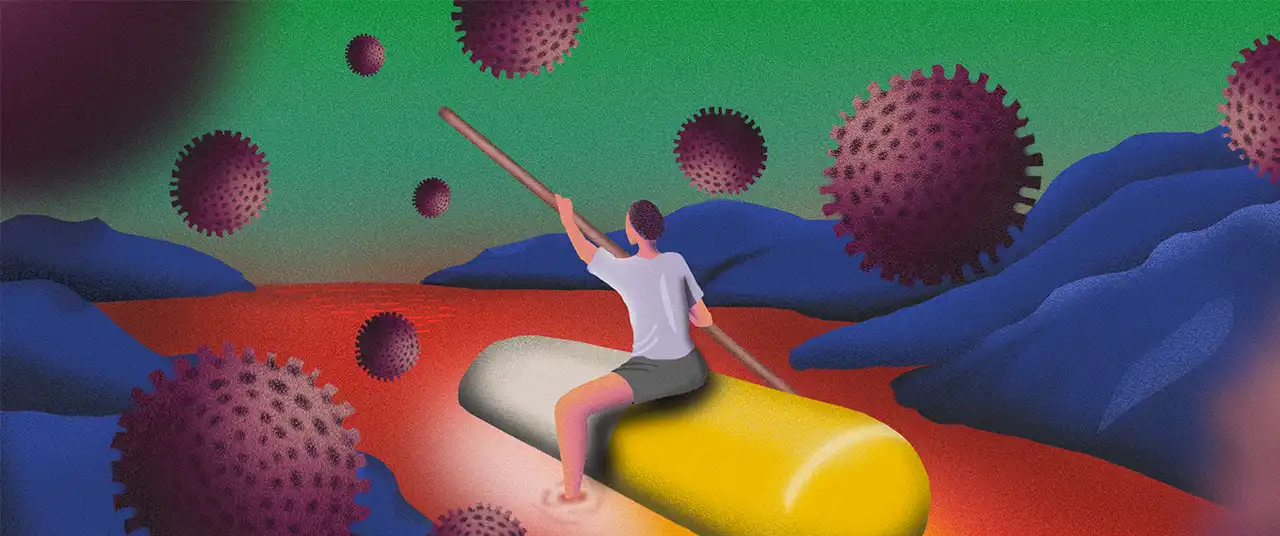Irresponsible drug use is making bacteria smarter. Here's how






Mohammad, a 22-year-old son of doctor parents, is no stranger to the routine that comes with an antibiotics prescription. Following through on a course of medication is something he rarely gives a second thought to. But, if the illness is not severe, the Bengaluru resident finds himself forgetting about the need to take them—especially as he begins to recover.
Now, with leftover antibiotics at hand, Mohammad does something that is not unusual for patients—he puts them away in a medicine cabinet for future use. “People have a tendency to save everything. I know many who keep medications for later. It’s the Indian stereotype of hoarding things… my grandmother keeps medications from two to three years ago, and buys them in bulk,” he says.
The growing overuse and misuse of antibiotics in India, and the resultant antimicrobial resistance, is further compounded by issues of personal misuse, from self-medication and overconsumption to patients ending their antibiotic courses prematurely. Though seemingly minor, these habits accelerate the spread of resistant bacteria, making infections harder to treat.
Quick fix much?
For young corporate employees like Bengaluru-based Apoorva, a long antibiotic course can seem like an inconvenience, pushing them to ask doctors for shorter courses when they are afflicted with common infections. “I don’t have the patience for a week-long course,” Apoorva rues, “I often forget to finish it anyway. With work and my personal commitments, I would rather have something stronger and be done with it.”
Dr Mohsin Bawkar, a physician specialising in occupational medicine for over three decades, attests to the prevalence of this sentiment. “Patients worry and ask for an antibiotic when they’re travelling, regardless of whether they need it or not. Working professionals ask for stronger courses because they can’t afford to take leaves at work,” Dr Bawkar says, asserting that the unnecessary use of stronger third-generation drugs worsens resistance.
.avif)
Those on the other side of the examination table, too, are responsible for furthering this questionable habit. “Some practitioners, especially in smaller cities, skip established guidelines. Instead of starting with penicillin—the most basic antibiotic—they may prescribe stronger options like Augmentin or Cephalosporins, which are third-generation drugs,” the physician says. (Third-generation drugs are a class of medication that are typically more concentrated and effective, but known to pose severe long-term risks in cases where they are prescribed for common infections.)
There have been cases where even infants have been administered potent medications, with the belief that they will recover speedily. “However, a quick recovery doesn’t always mean a complete recovery,” Dr Bawkar warns.
ALSO READ: Why common infections could become killers again
Doubt and discomfort
One among many consequences of Big Pharma’s aggressive promotion of antibiotics is a growing mistrust, or even outright refusal, to take antibiotics. Sanjana, a 22-year-old legal analyst in Bengaluru, has observed such a tendency in her extended family. “More than anything, they’re worried they’re using more than what is necessary—even if the doctor has assured them it’s not the case. They’re petrified of suspected side effects, too. There’s a real reluctance to even take antibiotics sometimes, let alone finish them,” Sanjana says. She has observed older relatives switching to “natural” remedies, such as soups, spice mixes, and fruit and veggie-based concoctions, once they begin to feel slightly better.
Sanjana’s family isn’t alone in this hesitation. Satya Sivaraman, a coordinator at ReAct Asia Pacific, an organisation advocating and working to mobilise policymakers and the public on the issue of antibiotic resistance, highlights the two extremes he has seen —overt scepticism, like the rise of vaccine denial, or flippant overuse of antibiotics, fueled by a lack of curiosity about one’s health and the tendency to outsource bodily well-being to medical practitioners.
What science tells us
“In hospital settings, it makes sense to discontinue a dose before an operation when we administer antibiotics to patients who could face the possibility of being at risk,” says Dr Sonal Asthana, a lead consultant in transplant surgery at Aster Hospital, drawing from his first-hand experiences in dealing with the complexities of antibiotic misuse.
Discontinuation turns problematic in non-clinical set-ups, in cases of bacterial culture or infection, where stopping medication is dangerously counterproductive. “This does not kill all the bacteria; it singles out the bacteria that are going to be resistant to the antibiotic. It’s only killing selective bacteria while the resistant bacteria will thrive and gradually grow immune to the antibiotic,” Dr Asthana cautions. This process, which accelerates the evolution of antibiotic-resistant strains, is termed selective pressure.
Dr. Baliwanth, a paediatrician at Manipal Hospital with a specialised interest in infectious diseases, emphasises the risk of not differentiating between viral infections and bacterial infections. Antibiotics are ineffective against viral infections; thus misdiagnosing a bacterial infection often results in the prescription of antibiotics even when they’re not necessary. The judicious use of antibiotics lies in the right prescription, he crucially points out. “When bacteria are exposed to antibiotics but not fully eradicated, they evolve, developing special enzymes to neutralise and destabilise the drugs,” says Dr Baliwanth. This leads to therapeutic failure, wherein the prescribed treatment no longer achieves its desired recovery and the pathogens survive.
Sanjana and Satya’s observations bring to light a common underlying hazardous assumption: that one might be ‘over-medicating’ if they complete their antibiotic course even after their symptoms subside.
Through genetic replication, the surviving bacteria reproduce, propagate, and transmit resistance genes within their population, leading to the proliferation of strains that the antibiotic can no longer effectively target. This fosters the spread of multidrug-resistant organisms (MDROs). Not only do incomplete antibiotic regimens reduce their efficacy over time but also contribute significantly to a reservoir of resistant pathogens that compromise infection control and treatment in the future.
ALSO READ: The looming crisis of post-antibiotic era
Where the buck stops
Dr Asthana brings to our attention hospital antibiotic stewardship programs, typically led by infectious disease specialists and microbiologists. “These teams collaborate to recommend appropriate antibiotic treatments and minimise antibiotic use whenever possible. Sure, this is definitely a more personalised approach than a systemic one, but it’s needed in a situation like ours. Both practitioners and the public need to exercise caution,” he says.
Personal responsibility is a crucial piece of this puzzle. When antibiotics are discontinued prematurely, there is the possibility of developing a recurring infection. Your doctor may then prescribe a full course of antibiotics again that needs to be finished in its entirety.
Completing an antibiotic regimen at an individual level is a small yet significant step in ensuring these medications remain effective for everyone.
It has repercussions for the bigger picture of public health and literacy. These informed choices, when made together, can help protect the potency of antibiotics across generations.
{{quiz}}
Explore other topics
References




.avif)

.avif)




